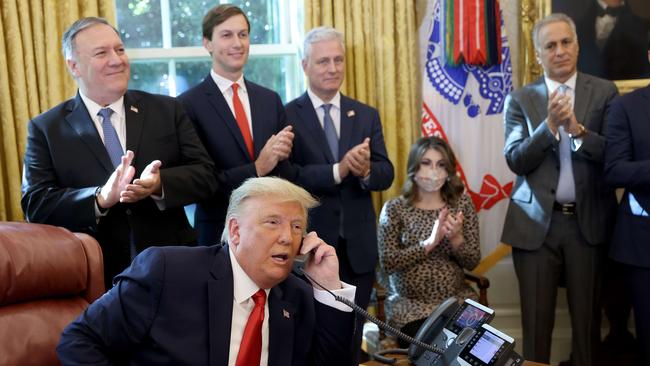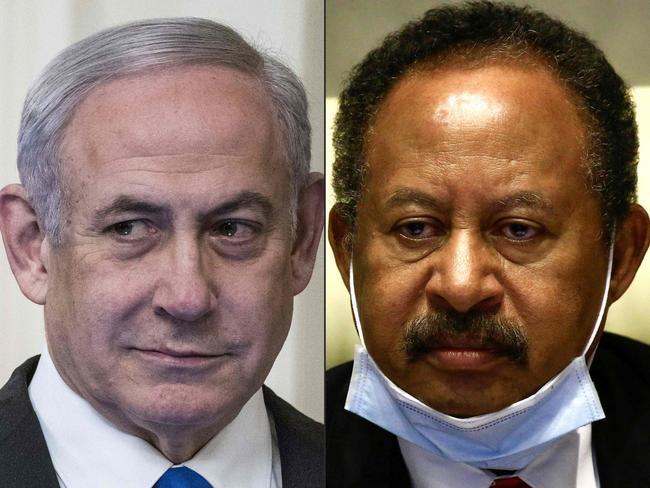Sudan-Israel deal marks Donald Trump as a presidential peacemaker
Donald Trump has turned the Middle East upside down with a treaty between Israel and Sudan.

In terms of concluding Arab-Israeli peace treaties, Trump is now the most successful US presidential peacemaker of all.
Certainly, his positive achievements dwarf those of the Barack Obama-Joe Biden administration, which was in office in Washington for eight years.
The Sudan deal was announced in a joint phone conversation with Israeli Prime Minister Benjamin Netanyahu and Sudan’s Prime Minister, Abdulla Hamdok, on Saturday AEDT. Netanyahu boldly declared: “It is a new world.”

The Sudan normalisation is the third Arab-Israeli peace treaty since August, the others involving the United Arab Emirates and Bahrain.
Trump foreshadowed the possibility of a deal with Saudi Arabia in the near future. That would be Earth-shattering.
It is almost impossible to overstate the significance of these moves. They represent the collapse of the old Middle East paradigm, which imprisoned the Obama administration, and the Middle East itself, and which the EU continues blindly to cling to.
The UAE and Bahrain deals were so significant partly because they want not just a cold formal peace, as Egypt and Jordan have with Israel, but full social, economic and cultural normalisation of relations with Jerusalem.
Arab popular culture is still awash with anti-Semitism and these agreements not only transcend that, but offer a way to combat it in the future.
But in some ways the agreement with Sudan is even more important. Unlike Bahrain and UAE, Sudan is a big nation, with a population of 41 million and a long history of military conflict with Israel.
It sent troops to the 1948 war when the Arab world tried to kill the fledgling Jewish state at birth. It also sent troops to the 1967 Arab-Israeli war.
Khartoum hosted the 1967 Arab League summit, which issued its famous “three Nos”— no peace, recognition or negotiations with Israel.
After Sudan took an Islamist turn in the late 1980s it became a regular ally of Iran and helped smuggle weapons into Gaza. As a result, Israel repeatedly struck military targets in Sudan. As part of this new peace deal, Sudan agreed to pay compensation to American families who were victims of terrorists it gave shelter to in the 1990s. Trump took Sudan off the list of terror-sponsoring states and Sudan will receive significant American aid, similar to the arrangements that underpinned the peace treaty with Egypt.
Jimmy Carter’s wooing of Egypt remains the single biggest peace move affecting Israel since 1948, but Trump’s record is now extremely strong.
The move is also a vindication of Netanyahu’s strategy towards the Palestinians, which he once explained to me in an interview as an “outside-in” approach. Normalise Israel’s situation first, then prospects for peace with the Palestinians are better.
Sudan’s politics are complex. Anti-Israel sentiment is probably stronger in Sudan than in the Gulf Arab states. Bedding the deal down will require astute diplomacy from the US and Israel, and some courage from Sudan’s leaders. It could go wrong.
Naturally, Trump couldn’t resist a crude effort to wring domestic political benefit out of an authentically historic moment, asking an embarrassed Netanyahu: “Do you think Sleepy Joe (Biden) could have done this deal, Bibi?”
Nonetheless, Trump has a point.
John Kerry, secretary of state when Biden was vice-president and a key adviser to Biden, declared as doctrine that there could never be peace between Israel and its neighbours unless the Palestinian issue was solved first. In this matter, Kerry was wrong, Trump was right. All the Ivy League pretentiousness in the world, it turns out, is not as useful as an instinct for power relations.
Trump’s record in the Middle East is impressive: three historic peace agreements; military defeat of Islamic State; elimination of ISIS head Abu Bark al-Baghdadi; stepping away from the hopeless nuclear deal with Iran and putting Tehran under sustained sanctions that limit its ability to sponsor terrorism and intervene throughout the Middle East while holding out the prospect of a new deal with Iran; elimination of Iran’s Quds Force commander, Qassem Soleimani.
And two actions that honoured Trump election promises: moving the US embassy to Jerusalem and drawing down some US troops from the Middle East. Trump is the first president since Carter not to launch a military campaign against another nation.
Trump is guilty of a million sins. But no president has a better record in the Middle East.




Donald Trump has turned the Middle East upside down with a new peace treaty between Israel and Sudan.